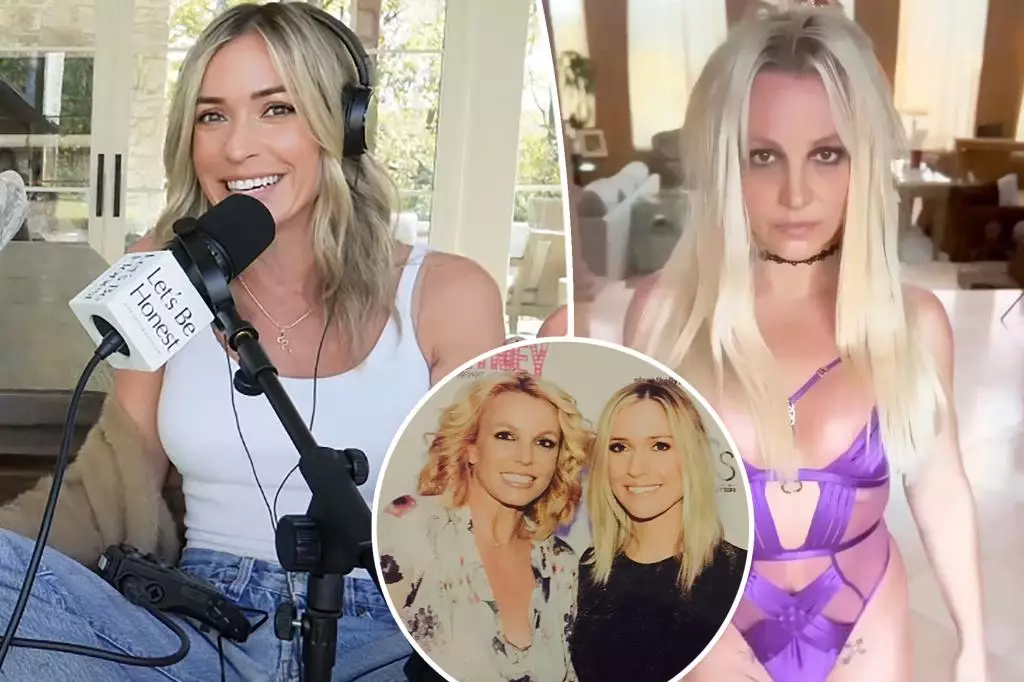In a recent episode of her podcast, “Let’s Be Honest,” Kristin Cavallari sparked a surprising feud with pop icon Britney Spears over what many would deem a trivial matter: perceived ghosting. The backdrop of this drama appears to be intertwined with a conspiracy theory that Cavallari herself propagated, suggesting that the Britney fans see today is not the real Britney but rather a clone. The audacity of this claim pushed Spears to reach out to Cavallari in an attempt to connect, but what was meant to be a friendly gesture quickly turned into a media spectacle.
Cavallari disclosed that she was both excited and apprehensive when she received a group message that included Spears and her manager. She described her emotional turmoil and fear, illustrating that her conspiracy theories could have put her in the crosshairs of the pop star. This episode highlights how quickly social media and celebrity relationships can escalate. Instead of bringing both women closer with a shared laugh over a wild theory, it seems to have unintentionally severed ties rather than cement them.
What makes this situation more complex is the interpretation of intentions behind the communication. Cavallari, during an emotional recounting, expressed her feelings of disappointment and mistrust, believing that Spears’ reaching out was merely a pretext to silence her assertions regarding the alleged cloning. She felt manipulated, as if the interaction was not sincere.
In reality, reports compiled by insiders suggest that Spears’ intentions weren’t malicious. Instead, she reportedly admired Cavallari and wanted to foster a friendship. However, once the text thread evolved into an unexpected snub—Spears seemingly ghosting Cavallari after a follow-up message—the narrative took a different turn. This echoes the broader cultural discourse around celebrity interactions, illustrating how misunderstandings can bloom within the often chaotic realm of fame.
Cavallari’s candor about feeling “scared” showcases a gritty reality check. Navigating celebrity friendships can be treacherous, especially when mental health and trust are at stake. Instead of cultivating camaraderie, misinterpretations can lead to accusations and vitriol, as it did in this instance. Her proclamation that “you messed with the wrong girl” not only underscores her emotional response but also reflects larger narratives of betrayals often echoed in Hollywood.
Moreover, Cavallari’s insistence of being unaffected by “Hollywood games” implies a deeper yearning for authenticity—something that can be hard to find amid the glitz and glamour. She openly ponders her motivations and those of Spears, questioning whether the desire for friendship was overshadowed by an ulterior motive to silence her behind-the-scenes buzz. This sentiment resonates with many seeking genuine relationships within a superficial industry.
Despite expressing ire over the lack of response, Cavallari concluded her episode with a glimmer of hope—an unchanged desire to form a friendship with Spears. “I still want to hang out, Britney,” she said, a plea for reconciliation echoed amid the online chaos. It embodies the human element often obscured by celebrity persona.
Just as Cavallari publicly grapples with thoughts of betrayal intertwined with a leadership in conspiracy culture, she undoubtedly yearns to return to familiarity. This provides insight into the often lonely realm of celebrity, where public personas clash and mesh in unpredictable ways.
As they navigate the overwhelming waves of public perception and personal emotions, both women might find that authenticity, even in miscommunication, is essential to fostering any meaningful bond. Whether this situation leads to further conflict or eventual friendship remains to be seen, yet both speak to the potential and pitfalls that lie at the intersection of fame and personal relationships.
In the end, this tale becomes a reflection on how the complexities of celebrity culture can distort perceptions and relationships—a timely reminder that trust, once fractured, is difficult to mend in an environment where every interaction is under the scrutiny of public eyes.

